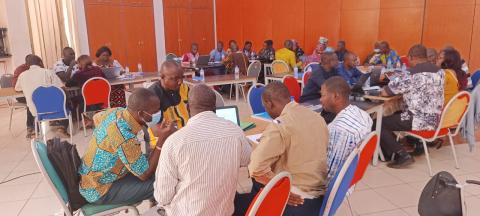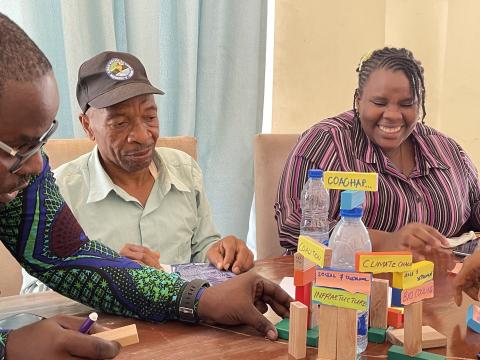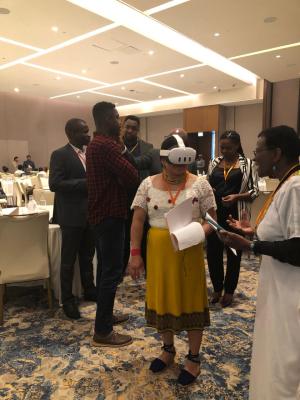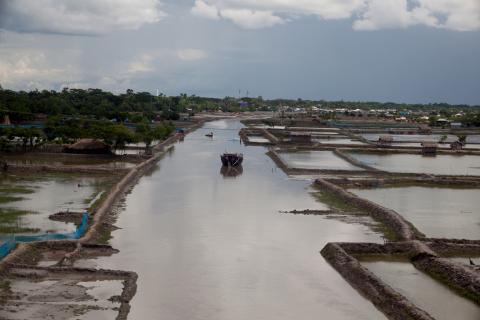Democratising knowledge for transformative climate action
Democratising knowledge for transformative climate action
The urgency of the climate crisis highlights the importance of providing and exchanging information that is accessible, easy to understand and delivered promptly, enabling vulnerable groups to effectively plan and adapt to the impacts of climate change. However, in most cases, the knowledge systems around climate change are overly scientific, top-down and insufficiently dynamic to convey information that could be useful for local-level climate action. Making knowledge systems more diverse to meet the needs of multiple stakeholders and audiences has been at the forefront of the climate change conversations, especially for adaptation. One such conversation began at CBA18 (in Arusha, Tanzania, in May 2024) where key implementers of the Step Change initiative - led by IDRC and their partners - explored how climate change knowledge brokering could be co-created in an inclusive and innovative manner for resilience building at the local level where it is most needed.
Knowledge brokering is the process of moving knowledge into action, where knowledge brokers link producers and users of knowledge to facilitate the generation, dissemination and eventual use of that knowledge. The range of activities they are involved in can be understood along a spectrum that goes from working with information flows and synthesising knowledge to be more understandable and relevant, to convening and partnering with different knowledge holders and seeking to bring about systemic change.

Inclusive knowledge brokering
Establishing platforms for communities to actively engage and lead in knowledge brokering processes is essential for inclusive climate action. The conventional scientific approaches that disseminate information in a top-down, hierarchical manner have traditionally failed to address the needs of the communities most impacted by climate change. Recognising the inputs of communities in knowledge and information dissemination processes can empower them to shape decision-making processes directly. Empowering communities goes beyond recognising their inputs by appreciating the diverse expertise presented by different marginalised groups including young people, women and those living with disabilities. This involves listening and incorporating their perspectives into decision-making and planning, including through co-creation processes that bring together different stakeholders.
Community organisations can help by creating platforms where these diverse voices are heard at different levels and ensure that there are proper channels for feedback. Using communication styles and language that resonate with communities (including visuals), translating information into local dialects, incorporating aids for those with limited literacy skills and utilising diverse media formats and technologies to reach a broader audience are all means to enhance inclusivity. This approach enables communities to trust the knowledge brokering process as it genuinely reflects their requirements and needs.

Participatory approaches for building resilience
Participatory approaches can help to enhance inclusivity and ownership for the long-term sustainability of local adaptation initiatives. Engaging community members alongside key stakeholders during project cycles can for instance capture insights that may not otherwise emerge during traditional Monitoring, Evaluation and Learning (MEL) processes.
A participatory tool like citizen science can empower community members to contribute to scientific research and knowledge dissemination by leading the evidence-building processes needed to influence decision makers and getting involved in adaptation initiatives.
Storytelling methods like theatre, songs and poetry can also be powerful participatory and co-creation tools for community engagement, communicating complex issues on climate change and as learning platforms for inspiring climate resilience efforts in other areas.
Interactive experiential activities and games can similarly help to break down power hierarchies and abstract scientific jargon. These approaches can remove barriers to dialogue such as socially constructed divisions in communities including power dynamics, through creating space for people to focus on common issues affecting them and defining narratives for innovative solutions. Through games, a neutral space is created in which communities and external stakeholders are able to learn in a fun yet serious way to jointly design decisions and actions that address their needs. Having said this, it is important to always be cognisant of the context in which games are being used and how they are being introduced to avoid trivialising the urgency of climate change or people’s circumstances.

The role of digital tools
Digital tools and platforms such as mobile technology, radio, television and social media have transformed the way climate knowledge is shared, enabling knowledge brokers to be more inclusive and effective in reaching diverse audiences. Digital tools offer knowledge brokers the chance to experiment and innovate, creating resources that simplify climate issues, while being cautious about not oversimplifying them as that can diminish the urgency or retention of knowledge for taking action. Finding a balance between simplicity and providing the necessary information is crucial.
However it's important to acknowledge the nature of tools used for disseminating information as they may inadvertently exclude individuals who lack internet access and those without the technical know-how to find credible, relevant information online. These individuals may include people with vision and hearing disabilities, older people and those living in rural areas without connectivity. Understanding the communication and capacity needs of the target audiences is critical to design appropriate, needs-responsive tools.
Additionally, the rapid spread of information on digital platforms can result in misinformation, misleading content and misinterpretations, which can be countered by knowledge brokers managing and verifying the information shared with communities.
Using digital innovation for community engagement
In Ghana, CDKN has experimented with using approaches like songs, television shows and virtual reality to raise awareness about climate change and motivate action. By understanding and employing communication channels that resonate with the local culture, CDKN effectively engages with communities ensuring that climate information is accessible and gains local traction.
Farm Radio International in Burkina Faso works with communities to identify their needs, existing knowledge and experiences to help shape radio programmes, which are co-created with a national platform of actors to integrate the academic and local knowledge. Listening groups and interactive systems for feedback ensure that messages about climate action are customised to meet needs and that community voices are acknowledged and acted upon.
Uttaran combines community insights and local knowledge with technology by creating localised forecast systems for tidal surges using artificial intelligence to enable anticipatory measures against tidal surges, particularly in areas currently devoid of surge warnings. This initiative aims to create Women-Centered Early Action Protocols and develop a comprehensive early warning system, empowering women with knowledge and resources for timely responses, addressing vulnerabilities, and mitigating impacts on coastal communities in Bangladesh. This approach also facilitates the calculation of anticipatory loss and damage, allowing for more proactive mitigation strategies, and it strengthens the government's ability to provide targeted impact-based forecasts.

The power of co-creation
Co-creation is a core strategy in knowledge brokering for promoting knowledge exchange that is inclusive, participatory and innovative. By working with communities and other actors, knowledge brokers can ensure climate change information is not just shared but co-created in a way that reflects the real experiences and insights of diverse groups of people. Here are some actions that could support the co-creation process:
- Use participatory methods that bring together local knowledge and scientific perspectives to encourage ownership and long-term sustainability of climate action initiatives across scales (local to national).
- Where necessary, integrate digital tools for timely information flow and feedback, while establishing systems to ensure the accuracy and authenticity of information shared.
- Establish opportunities and open platforms for interaction to bring in diverse voices, especially those of the most marginalised groups in the community and co-design responses to the challenges being faced.
- Strengthen local stakeholders’ capacity to lead the knowledge brokering processes, ensuring their perspectives are at the forefront of discussions on climate action.
- Invest in continuous learning to keep up-to-date with innovative approaches and adjust strategies as needed, to increase their effectiveness and inclusivity.
